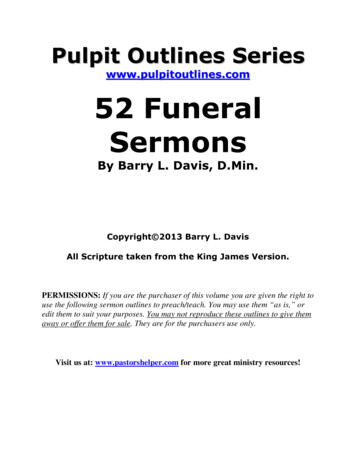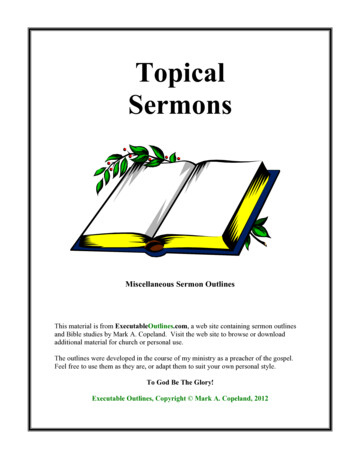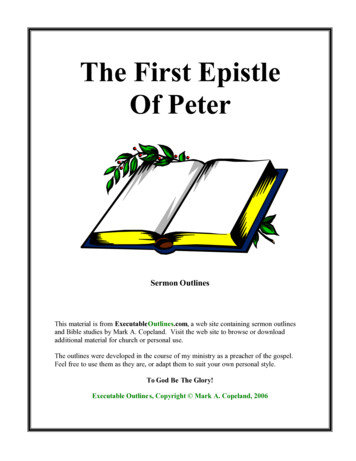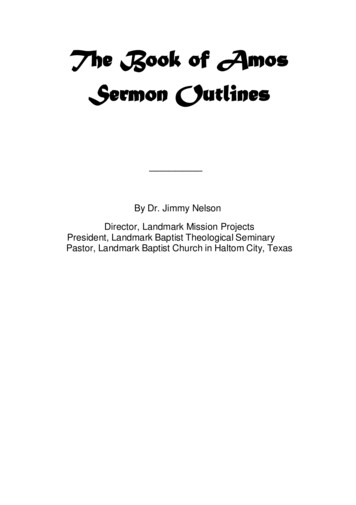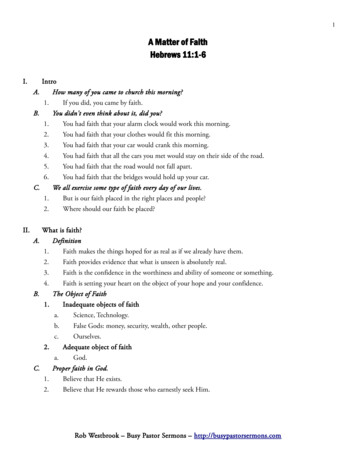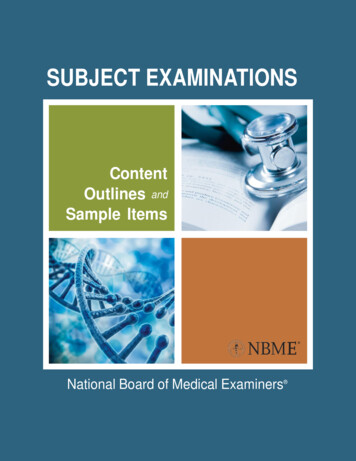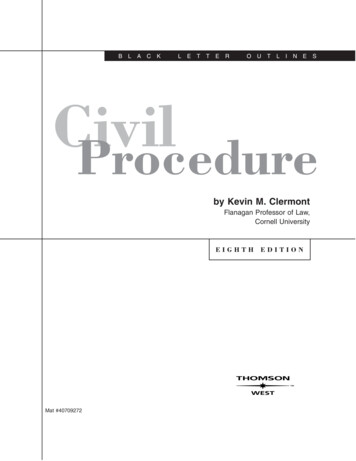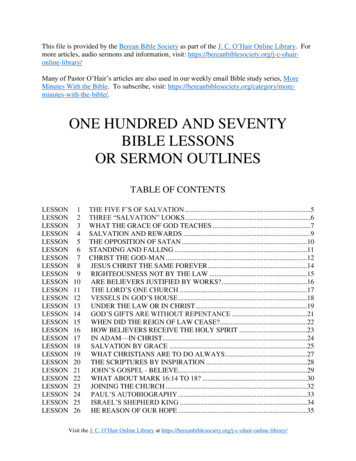
Transcription
MY SERMON OUTLINES(VOLUME THREE)David Cambridge
Copyright DECambridge2009All rights reserved. No part of this booklet may be stored or reproduced in any form without the written permission from the author.david.cambridge@talk21.comIT IS ILLEGAL AND UNETHICAL TO DUPLICATE COPYRIGHTED MATERIAL
44145146147148149150Practical Personal EvangelismPractically Instant RetributionPressing On Unto PerfectionProblems Nehemiah FacedPut Away Your SwordRemembering How To BehaveRemove The Wicked Man From Among YourselvesSaved By GraceSaved By Grace Through FaithSeeds Of DivisionSeeking The LostSelecting A ChurchShould You Believe In The Trinity?Signs Of InsincerityGoing On To PerfectionSin BustersSitting At Jesus’ FeetSmokingSpiritual GrowthSpiritual MannaSpiritual Vigor“Submit To Them That Have The Rule Over You”Teaching Bible Baptism To BelieversTemptationThat Sinking FeelingThe Characteristics Of A ChristianThe Christian And The MediaThe Christian WalkThe Church And YouThe Company Of WolvesThe Cost Of DiscipleshipThe Death Of ChristThe Death Of JesusThe Deity Of Jesus ChristThe Effects Of God’s GraceThe FallThe First Century Utopian ChurchThe Genesis SolutionThe Great ConfessionThe Greatest In The KingdomThe Hiding PlaceThe Hope Of Your CallingThe Importance Of Private Bible StudyThe Just Shall Live By FaithThe Law And The SabbathThe Love Of ChristThe Mystery Of GodlinessThe Objective Of Being A ChristianThe OccultThe One Baptism 155161163165169173175177179
My Sermons by David CambridgePRACTICAL PERSONAL EVANGELISMIntroduction1. Spring time is a time of growth and new life; trees are budding, flowers are blooming, new lambs can be heardbleating, and a man's thoughts turn to the grass that needs mowing already.2. It is also about this time of year that this congregation turns its thoughts to numerical growth, through preachingof the gospel of life.3. Each of us is a member of the Church of God, and, as such, we have an individual responsibility to participate inthe spreading of the gospel. We need to involve ourselves in the corporate efforts of the church, but we also havean individual responsibility to evangelize to the lost.“For though I preach the gospel, I have nothing to glory of: For necessity is laid uponme; yea, woe is unto me, if I preach not the gospel!” (1 Corinthians 9:16).I. THE NEED TO EVANGELIZE (Read Romans 3:10-12)A. All has sinned.“As it is written, There is none righteous, no, not one: There is none that understandeth, there isnone that seeketh after God. They are all gone out of the way, they are together becomeunprofitable; there is none that doeth good, no, not one” (Romans 3:10- 12)B. Majority of people will be lost, only a few will be saved (Matthew 7:13-14 Matthew 20:16; 22:14; Luke 13:23).C. The fate of the sinner is eternal torment and punishment (Matthew 25:46; Luke 16:28).D. The following illustrations show the number of souls that are being lost, and the desperate need for morelaborers in the vineyard.1. Man on cliff edge saving lemmings.2. Man at foot of dam stopping leak, which gets worse.II. NEW TESTAMENT EXAMPLESA. The Philippian Church was holding forth the word of life (Philippians 2:15-16).B. Paul praised the Thessalonian Church for their evangelistic effort (1 Thessalonians 1:8).C. Aquila and Priscilla preached Jesus to Apollos (Acts 18:24-26).D. Cornelius gathered his friends and family to hear the gospel (Acts 10:24-27).E. Andrew brought his brother Simon to Jesus (John 1:40-42a).F. Philip brought Nathanael to the Lord (John 1:43-46).G. Many were bringing their children to Jesus (Matthew 19:13-14).H. Persecution did not prevent Christians preaching the word (Acts 8:4).III. PREREQUISITES TO EVANGELISMA. You must have a desire to save the lost.1. If we have any natural affection (2 Timothy 3:3), if we have any love for our neighbor (Galatians 5:14), we willsurely desire their salvation (Romans 10:1).2. If we understand the terror of the Lord, we will feel compelled to warn others (2 Corinthians 5:11).7
My Sermons by David Cambridge“And others save with fear, pulling them out of the fire; hating even the garment spotted by theflesh” (Jude 1:23)3. Then, like Paul, we will view our responsibility to evangelize, as a necessity laid upon us (1 Corinthians 9:16).B. Remember where the real power to save lies.1. The gospel is the power of God unto salvation (Romans 1:16 Hebrews 4:12; Romans 10:17 2 Corinthians 5:19b).2. We are only laborers, sowers, sowing the seed, the word of God (Luke 8:11).3. But it is God who gives the increase (1 Corinthians 3:5-7 Acts16:14).C. Pray!1. Pray for the Lord to raise up more laborers.“Therefore said he unto them, The harvest truly is great, but the laborers are few: pray yetherefore the Lord of the harvest, that he would send forth laborers into his harvest” (Luke 10:2).2. Pray that the word may have free course (2 Thessalonians 3:1).3. Pray for boldness to speak (Acts 4:29-31).IV. PRACTICAL EVANGELISMA. Corporate involvement (1 Corinthians 12:12-27).1. Join in the door knocking effort.2. 'Table in the market'.3. Help to distribute Bible course cards.4. Help distribute leaflet advertisements when we have a gospel meeting.B. Personal involvement - face to face.1. Invite friends, family, and neighbors to services.2. Make the effort to share the gospel with that workmate that you have put off doing for so long.3. When the gas man, electric man, insurance agent, etc. calls at your home, give them a tract as he leaves.4. Set up a weekly Bible study in your home, and send invitations to your neighbors.C. Personal involvement - indirect.1. Put a 5” x 3” postcard in a newsagent window, advertising the free Bible course (From 20p - 90p per week).2. Leave tracts etc. in public places - restaurants, cinemas, restrooms.3. When you write letters, whether to friends, family, pop a tract in with it.4. If you travel by public transport, leave a Bible course card on the seat.5. If you know someone with a problem, find a tract or tape on that subject that might help them.6. Support an evangelist!8
My Sermons by David CambridgeConclusion1. The world is full of people who are dead in trespasses and sins, and unless they hear the gospel, they cannot besaved; as the scripture says, “taking vengeance on those who do not know God”. But how shall they hear unlessyou speak? How shall they be saved except you show them the way?2. Final thought: Read Ezekiel 3:18-19.9
My Sermons by David Cambridge10
My Sermons by David CambridgePRACTICALLY INSTANT RETRIBUTIONIntroduction[A brief word explaining Karma]1. When God made His covenant with Israel, He promised them security, wealth, and possessions, if they kept Hislaws. But if they forgot Him and disobeyed His laws they would lose all such blessings (Exodus 23:20-26;Deuteronomy 7:12- 16; 28:15-68). This theme runs all through the Old Testament and so it is easy to understand whypeople might see material wealth as conformation that one is pleasing to God, and that misfortune and sufferingis a sign of the Lord's disapproval and punishment for sin. The statement of Jesus to a crippled man seems tosubstantiate this belief: “See you have been made well. Sin nor more, lest a worse thing come upon you” (John5:14).2. But the Bible also admits that the righteous suffer, even though they have not sinned to deserve it: “Blessed arethose who are persecuted for righteousness sake, for theirs is the kingdom of heaven” (Matthew 5:10), and “Buteven if you should suffer for righteousness' sake, you are blessed” (1 Peter 3:14). Jesus, on one occasion,mentioned an incident in which eighteen people were killed by accident, Jesus clearly says that they were noworse sinners than others (Luke 13:1-5).3. It is clear, then, that we ought to have a balanced view. But there were some in Jesus' day that did not have such abalanced view, believing that all misfortune and suffering was because of some sin committed (John 9:1-2; Luke13:1-5). This thinking is not new, Job 4:7-9; 5:6. Even today there are Christians who hold such a belief. And, aswe have already mentioned, a similar belief is one of the fundamental teachings of Hinduism.4. In this lesson we will examine the evil of such a view, i.e. instant retribution.I. THE EFFECT OF INSTANT RETRIBUTION ON THE HEARTA. Toward the 'sinner'.1. They (i.e. those suffering some misfortune or affliction) are considered accursed of God (John 9:2).2. Because they are viewed as sinners, they are despised (Luke 18:9).3. The heart is desensitized to the suffering of other. Such insensitivity can be seen in Eliphaz's words inresponse to the suffering of Job:“Whoever perished being innocent those who plow iniquity and sow trouble reap the same”(Job 4:7-8).4. Justice, mercy, and compassion are neglected (Cp. Matthew 23:23; Luke 10:30-32).B. Toward self1. Material blessings and good health are seen as a sign of God's approval of our lifestyle and beliefs (Luke18:9). Pride.2. What if some misfortune or suffering should befall them? They would simply blame Satan for such! Thus,their righteousness remains in tact.3. Considering all the above points, it is easy to see how such a person would want to separate themselvesfrom other, who to them are sinners. [Note: This describes exactly the attitude of the Pharisees, in fact, the word Phariseemeans “separated ones”].11
My Sermons by David CambridgeII. A BELIEF IN INSTANT RETRIBUTION MAY BE USED AS SHIELD AND A WEAPONA. A shield1. Despite the clear reasoning of the blind man, the Pharisees dismissed all that he said on the grounds that hewas “completely born in sins” (John 9:34).2. Thus, whatever is taught by the 'sinner' that is not palatable may be dismissed. And so the mind is closed.B. Conform, or else!1. The natives of Malta concluded that Paul was a murderer but had escaped the sea. Now when a viper bitPaul they saw it as justice (or instant retribution) being done (Acts 28:4).2. So, then, a person could be threatened and bullied into conforming to certain behavior and beliefs.III. JESUS’ REACTION TO SUFFERINGA. Misfortune and suffering not necessarily a punishment for sin.1. Jesus said concerning the blind man, “Neither this man nor his parents sinned ” (John 9:3; Cp. Ezekiel 18:20).2. Two incidents are mentioned (Luke 13:1, 4), were they being punished for their sins? Jesus replied,“Do you think that they were worse sinners I tell you, no” (Luke 13:3, 5).3. Was Job's suffering because of some sin he committed? The Lord said to Job's friends, who said it was so,“My wrath is aroused against you and your two friends, for you have not spoken of Mewhat is right ” (Job 42:7).B. Reaction to suffering1. Not judgment, compassion (John 9:1-7; Luke 7:12-15).2. Our attitude should be the same (Luke 10:30-37) Parable of the Good Samaritan.Conclusion1. Holding such an extreme view of sin and punishment hardens the heart against the sufferings of our fellow man. Itcan also have the effect of closing our minds to learning, since we are not willing to listen to the words of a'sinner'.2. Because suffering and misfortune comes upon us all (Matthew 5:45) it means then that the 'instant retributionalist'has to explain misfortune and suffering in his own life. This he does by blaming such on Satan. The thinking,then, is “The Devil may bring misfortune and suffering into my righteous life, but it is the result of sin thatbrings it into yours”.3. Christians, I believe, should have a more balanced view. Maybe, at times, we are suffering for some sin we havecommitted. Maybe, sometimes, we suffer because we are living righteously. But bad things may also happen justin the normal course of living.4. These things being so, we ought to be careful about making judgments about the suffering of others andourselves. Rather than judging, let us respond with love and compassion.“Remember the prisoners as if chained with them, and those who are mistreated, since youyourselves are in the body also” (Hebrews 13:3)12
My Sermons by David CambridgePRESSING ON UNTO PERFECTIONConforming To Christ's ImageIntroduction1. Consider what it means to be “in Christ”:a. Those baptized into Christ have put on Christ:“For as many of you as have been baptized into Christ have put on Christ” (Galatians 3:27)b. Those in Christ have no condemnation to fear:“There is therefore now no condemnation to them which are in Christ Jesus, who walk notafter the flesh, but after the Spirit” (Romans 8:1)c. Those in Christ have received every spiritual blessing:“Paul, an apostle of Jesus Christ by the will of God, to the saints which are at Ephesus, and tothe faithful in Christ Jesus: Grace be to you, and peace, from God our Father, and from theLord Jesus Christ. Blessed be the God and Father of our Lord Jesus Christ, who hath blessedus with all spiritual blessings in heavenly places in Christ” (Ephesians 1:1-3)2. We were guilty but have now been justified:a. Justified in His name:“Know ye not that the unrighteous shall not inherit the kingdom of God? Be not deceived: neitherfornicators, nor idolaters, nor adulterers, nor effeminate, nor abusers of themselves withmankind, Nor thieves, nor covetous, nor drunkards, nor revilers, nor extortioners, shall inherit thekingdom of God. And such were some of you: but ye are washed, but ye are sanctified, but ye arejustified in the name of the Lord Jesus, and by the Spirit of our God” (1 Corinthians 6:9-11)b. Justified by His blood and saved from wrath:“Much more then, being now justified by his blood, we shall be saved from wrath throughhim” (Romans 5:9)3. Having been immersed, forgiven, and justified in His name, are we now perfect?I. WITNESSES OF IMPERFECTIONA. One step forward, two steps back!1. The brethren at Corinth were acting like mere men:“And I, brethren, could not speak unto you as unto spiritual, but as unto carnal, even as untobabes in Christ. I have fed you with milk, and not with meat: for hitherto ye were not able tobear it, neither yet now are ye able. For ye are yet carnal: for whereas there is among youenvying, and strife, and divisions, are ye not carnal, and walk as men” (1 Corinthians 3:1-3)2. The brethren in Galatia were in danger of falling from grace:“Stand fast therefore in the liberty wherewith Christ hath made us free, and be not entangledagain with the yoke of bondage. Behold, I Paul say unto you, that if ye be circumcised, Christshall profit you nothing. For I testify again to every man that is circumcised, that he is a debtorto do the whole law. Christ is become of no effect unto you, whosoever of you are justified bythe law; ye are fallen from grace” (Galatians 5:1-4)13
My Sermons by David CambridgeB. Down and out:1. Demas was a fellow laborer with Paul (Philemon 1:24) but his love of the world was his undoing:“For Demas hath forsaken me, having loved this present world, and is departed untoThessalonica; Crescens to Galatia, Titus unto Dalmatia” (2 Timothy 4:10)2. Peter mentioned certain brethren who had been overcome by the corruption that is in the world:“For when they speak great swelling words of vanity, they allure through the lusts of the flesh,through much wantonness, those that were clean escaped from them who live in error. Whilethey promise them liberty, they themselves are the servants of corruption: for of whom a man isovercome, of the same is he brought in bondage. For if after they have escaped the pollutions ofthe world through the knowledge of the Lord and Savior Jesus Christ, they are again entangledtherein, and overcome, the latter end is worse with them than the beginning” (2 Peter 2:18-20)C. Any honest person will confess that they are not perfect:1. James gives witness to man’s imperfection:“For in many things we offend all. If any man offend not in word, the same is a perfect man,and able also to bridle the whole body” (James 3:2)“And the tongue is a fire, a world of iniquity: so is the tongue among our members, that itdefileth the whole body, and setteth on fire the course of nature; and it is set on fire of hell”(James 3:6)“But the tongue can no man tame; it is an unruly evil, full of deadly poison” (James 3:8)2. John is even more direct:“If we say that we have no sin, we deceive ourselves, and the truth is not in us. If we confessour sins, he is faithful and just to forgive us our sins, and to cleanse us from allunrighteousness. If we say that we have not sinned, we make him a liar, and his word is not inus” (1 John 1:8-10)[Yes, we were cleansed from our past sins and justified in His name. Yet this, by no means, implies that we are perfect in all our ways. In fact,there is still a long way to go before we even come close to conforming to the image of Christ. We shall now consider two questions: in whatareas do we need to strive for perfection? What will aid us as we strive toward that goal?]II. PRESSING ON UNTO PERFECTIONA. Conduct:1. Commands to watch our conduct:a. Though specifically written to Timothy, Paul’s instruction is applicable to all Christians:“Let no man despise thy youth; but be thou an example of the believers, in speech, inconduct, in charity, in spirit, in faith, in purity” (1 Timothy 4:12)b. Specifically for all Christians:“Only let your conduct be as it becometh the gospel of Christ: that whether I come and seeyou, or else be absent, I may hear of your affairs, that ye stand fast in one spirit, with onemind striving together for the faith of the gospel” (Philippians 1:27)2. There are basically two realms in which we need to watch our conduct:a. In the House of God:14
My Sermons by David Cambridge“But if I tarry long, that thou mayest know how thou oughtest to conduct thyself in the house ofGod, which is the church of the living God, the pillar and ground of the truth” (1 Timothy 3:15)b. Toward outsiders:“Conduct yourselves with wisdom toward outsiders, making the most of the opportunity”(Colossians 4:5)3. Our conduct must be grounded and shaped on our fear and reverence for God:“And if ye call on the Father, who without respect of persons judgeth according to every man'swork, pass the time of your sojourning here in fear” (1 Peter 1:17)B. Speech:1. Our speech should always be governed by the principles of religion:“Let your speech be alway with grace, seasoned with salt, that ye may know how ye ought toanswer every man” (Colossians 4:6)2. For the benefit of hearers:“Let no corrupt communication proceed out of your mouth, but that which is good to the use ofedifying, that it may minister grace unto the hearers” (Ephesians 4:29)3. The mark of the wise:“The wise in heart shall be called prudent: and the sweetness of the lips increaseth learning.Understanding is a wellspring of life unto him that hath it: but the instruction of fools is folly.The Heart Of The Wise Teacheth His Mouth, And Addeth Learning To His Lips. Pleasantwords are as an honeycomb, sweet to the soul, and health to the bones” (Proverbs 16:21-24)[Having shown that we must continually strive to improve our conduct and speech, we will now consider the aids that are in place unto that end.]III. AIDS UNTO PERFECTIONA. Teachers:“Whom we preach, warning every man, and teaching every man in all wisdom; that we maypresent every man perfect in Christ Jesus” (Colossians 1:28)“Till we all come in the unity of the faith, and of the knowledge of the Son of God, unto aperfect man, unto the measure of the stature of the fulness of Christ” (Ephesians 4:13)B. Study:“All scripture is given by inspiration of God, and is profitable for doctrine, for reproof, forcorrection, for instruction in righteousness: That the man of God may be perfect, throughlyfurnished unto all good works” (2 Timothy 3:16-17)C. The example of others:“Let us therefore, as many as be perfect, be thus minded: and if in any thing ye be otherwiseminded, God shall reveal even this unto you. Nevertheless, whereto we have already attained,let us walk by the same rule, let us mind the same thing. Brethren, be followers together of me,and mark them which walk so as ye have us for an ensample” (Philippians 3:15-17)“Those things, which ye have both learned, and received, and heard, and seen in me, do: andthe God of peace shall be with you” (Philippians 4:9)15
My Sermons by David Cambridge“Remember them which have the rule over you, who have spoken unto you the word of God:whose faith follow, considering the end of their conversation” (Hebrews 13:7)“Be ye followers of me, even as I also am of Christ” (1 Corinthians 11:1)Conclusion1. When we first believed, we repented of our sins and were washed and justified in Jesus name.2. Yet we ought not to suppose that we are perfect! We have seen how the Corinthians were acting like mere men,and how the Galatians were in danger of falling from grace. James and John also demonstrate that we are by nomeans perfect and need the blood of Jesus to wash away our sins each day.3. But God has provided aids to bring to perfection: teachers, the word, and the example of others.4. The greatest example is Jesus. In all that we do or say, let us ask, “What would Jesus do?” or “What would Jesussay?”“If ye then be risen with Christ, seek those things which are above, where Christ sitteth on the righthand of God. Set your affection on things above, not on things on the earth. For ye are dead, and yourlife is hid with Christ in God. When Christ, who is our life, shall appear, then shall ye also appearwith him in glory. Mortify therefore your members which are upon the earth; fornication,uncleanness, inordinate affection, evil concupiscence, and covetousness, which is idolatry: For whichthings' sake the wrath of God cometh on the children of disobedience: In the which ye also walkedsome time, when ye lived in them. But now ye also put off all these; anger, wrath, malice, blasphemy,filthy communication out of your mouth. Lie not one to another, seeing that ye have put off the oldman with his deeds; And have put on the new man, which is renewed in knowledge after the image ofhim that created him” (Colossians 3:1-10)16
My Sermons by David CambridgePROBLEMS NEHEMIAH FACEDIntroduction1. Despite the many prophets that called them to repentance, Israel persisted in their unfaithfulness to God. So, inaccordance with His word, God used the Assyrians and Babylonians to chastise Judah and Israel. In 722 B.C.,the Assyrians deported the ten northern tribes throughout the known world (2 Kings 17) and in 586 B.C., theBabylonians took the two southern tribes into captivity (2 Kings 25).2. During their captivity, the balance of world power changed hands to the Persians and after 70 years, the Lordbegan bringing His people back home. The book of Ezra begins with the decree of king Cyrus to return God’speople to Jerusalem to rebuild God’s house in 539 B.C. Zerubbabel and Joshua led the first return (Ezra 1-6) andrebuilt the temple, Ezra led the second return (Ezra 7-10) in 458 B.C., and Nehemiah records the third return torebuild Jerusalem’s walls in 445 B.C.3. Nehemiah served as the King’s cupbearer and God caused him to find favour in the eyes of the king when hedesired to return to Jerusalem to rebuild its walls (Nehemiah 2:1-6). In this lesson, we shall look at some of theproblems he faced as he undertook this work and consider some applications regarding the building of the Lord’sspiritual house – the church – today.I. RIDICULE AND CRITICISMA. As they began to rebuild the walls, God’s people faced ridicule and criticism (Nehemiah 4:1-3).“Now it came about that when Sanballat heard that we were rebuilding the wall, he becamefurious and very angry and mocked the Jews. He spoke in the presence of his brothers and thewealthy men of Samaria and said, What are these feeble Jews doing? Are they going to restoreit for themselves? Can they offer sacrifices? Can they finish in a day? Can they revive thestones from the dusty rubble even the burned ones? Now Tobiah the Ammonite was near himand he said, Even what they are building--if a fox should jump on it, he would break their stonewall down!” (Nehemiah 4:1-3 NASB)1. Sanballat and Tobiah ridiculed God’s people in an attempt to discourage them from building the wall.Instead of trading insults, Nehemiah prayed.“Hear, O our God, how we are despised! Return their reproach on their own heads and givethem up for plunder in a land of captivity. Do not forgive their iniquity and let not their sin beblotted out before You, for they have demoralized the builders” (Nehemiah 4:4-5 NASB)2. The work prospered because the people had set their hearts on accomplishing the task. They did not loseheart or give up, but persevered in the work.“So we built the wall and the whole wall was joined together to half its height, for the peoplehad a mind to work” (Nehemiah 4:6 NASB)B. We also face opposition as we try to build God’s spiritual house - the church. Christians often comes underattack because of their insistence that there is only one way and because of their stand on moral issues.Christians are also mocked because of their stance on Biblical authority and insisting that the church must bebuilt according to the pattern.1. When the early disciples faced opposition they responded in the same way as Nehemiah - They prayed(Acts 4:23-31).2. We should never allow persecution, ridicule, and criticism to keep us from doing God's will. If wecontinue diligently in pray and have a mind to work, we will accomplish His will.17
My Sermons by David CambridgeII. OPEN WARFAREA. When ridicule and criticism didn't work, they conspired to fight against God's people.“Now when Sanballat, Tobiah, the Arabs, the Ammonites and the Ashdodites heard that therepair of the walls of Jerusalem went on, and that the breaches began to be closed, they werevery angry. All of them conspired together to come and fight against Jerusalem and to cause adisturbance in it. But we prayed to our God, and because of them we set up a guard againstthem day and night. Thus in Judah it was said, The strength of the burden bearers is failing,Yet there is much rubbish; And we ourselves are unable To rebuild the wall. Our enemies said,They will not know or see until we come among them, kill them and put a stop to the work.When the Jews who lived near them came and told us ten times, They will come up against usfrom every place where you may turn” (Nehemiah 4:7-12 NASB)1. Nehemiah encouraged the people to be prepared at all times.“Then I stationed men in the lowest parts of the space behind the wall, the exposed places, andI stationed the people in families with their swords, spears and bows. When I saw their fear, Irose and spoke to the nobles, the officials and the rest of the people: Do not be afraid of them;remember the Lord who is great and awesome, and fight for your brothers, your sons, yourdaughters, your wives and your houses” (Nehemiah 4:13-14 NASB)2. They were to aid one another in this great work.“I said to the nobles, the officials and the rest of the people, The work is great and extensive,and we are separated on the wall far from one another. At whatever place you hear the soundof the trumpet, rally to us there. Our God will fight for us. So we carried on the work with halfof them holding spears from dawn until the stars appeared” (Nehemiah 4:19-21 NASB)B. We, too, are now at war (1 Timothy 1:18; 6:12; Jude 3).1. But our warfare is not carnal but spiritual.“For though we walk in the flesh, we do not war according to the flesh, for the weapons of ourwarfare are not of the flesh, but divinely powerful for the destruction of fortresses. We aredestroying speculations and every lofty thing raised up against the knowledge of God, and weare taking every thought captive to the obedience of Christ” (2 Corinthians 10:3-5 NASB)2. Christianity is illegal in some countries and anyone who preaches the gospel is at risk of deportation,imprisonment, or possible worse. Christianity is not banned in this country, yet, but we have already seenmoves to ban the teaching of creationism and forbid prayers in schools. The rise of atheism and falsereligions, and the increase in immorality show that Christianity is dwindling and is, therefore, underattack. We need to realize that we are under attack but continue to work with a trowel in one hand andsword of the Spirit in the other.III. INTERNAL TROUBLESA. All their problems had come from outside but now there was trouble from the inside.“Now there was a great outcry of the people and of their wives against their Jewish brothers.For there were those who said, We, our sons and our daughters are many; therefore let us getgrain that we may eat and live. There were others who said, We are mortgaging our fields, ourvineyards and our houses that we might get grain because of the famine. Also there were thosewho said, We have borrowed money for the king's tax on our fields and our vineyards. Now ourflesh is like the flesh of our brothers, our children like their children. Yet behold, we areforcing our sons and our daughters to be slaves, and some of our daughters are forced intobondage already, and we are helpless because our fields and vineyards belong to others”(Nehemiah 5:1-5 NASB)18
My Sermons by David Cambridge1. Many of the returned exiles were suffering at the hands of some of their rich countrymen. The rich wouldlend money and when the debtors missed payments, they would take over their fields. Left with no meansof income, the debtors were forced to give up their children to slavery.2. Nehemiah quickly and courageously corrected the problem.“Then I was very angry when I had heard their outcry and these words. I consulted with myselfand contended with the nobles and the rulers and said to t
1. Put a 5” x 3” postcard in a newsagent window, advertising the free Bible course (From 20p - 90p per week). 2. Leave tracts etc. in public places - restaurants, cinemas, restrooms. 3. When you write letters, whether to friends, family, pop a tract in with it. 4. If you travel by pu
